|
|
|
Sort Order |
|
|
|
Items / Page
|
|
|
|
|
|
|
| Srl | Item |
| 1 |
ID:
178453
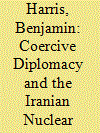

|
|
|
|
|
| Summary/Abstract |
Coercive diplomacy was utilized by a coalition of the United States, United Kingdom, France, Russia, China and Germany (collectively known as the P5+1) to negotiate an end to the Iranian nuclear crisis from 2002–2013. Eventually, this approach culminated in the Geneva interim agreement and the Joint Comprehensive Plan of Action in November 2013 and October 2015, respectively. This article charts the course of the P5+1’s coercive diplomacy efforts against Iran and demonstrates that coercive diplomacy pressured Iran to a point where the cost of continued resistance was too high to continue enduring. It shows that a combination of factors succeeded after 11 years of a coercive diplomacy strategy. These findings will have implications for policymaking and academia, as it is a rare illustration of successful, coalitional coercive diplomacy.
|
|
|
|
|
|
|
|
|
|
|
|
|
|
|
|
| 2 |
ID:
178457
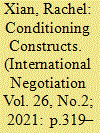

|
|
|
|
|
| Summary/Abstract |
Political psychology and social constructivism exist in an “ideational alliance” against realism; however, both have overlooked behavioral conditioning, the basis of animal learning. Through six stages situated in international negotiation behaviors, the theory of Conditioning Constructs shows how behavioral conditioning can take parties from specific to diffuse reciprocity, rationalist to constructivist cooperation, and crisis to durable peace. In stages 1, 2 and 3, parties use negotiated agreements to exit prisoner’s dilemmas, continuously reinforce cooperation during agreement implementation, and satiate to rewards as initial implementation finalizes. In stages 4, 5 and 6, parties receive fresh rewards with new negotiations, undergo intermittent reinforcement with periodic agreements thereafter, and finally attribute cooperative behavior to actor constructs. Conditioning Constructs demonstrates that agency is possible in socially constructed structures through willful participation in conditioning through negotiation; and that, while Anatol Rapoport’s tit-for-tat strategy is suited to initial cooperation, intermittent reinforcement better preserves late-stage cooperation.
|
|
|
|
|
|
|
|
|
|
|
|
|
|
|
|
| 3 |
ID:
178451
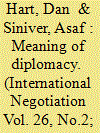

|
|
|
|
|
| Summary/Abstract |
This article draws on interviews with 198 state ambassadors and applies an interpretivist lens to provide a more nuanced conceptualization of diplomacy. In doing so, we seek to project a closer fit between scholarly definitions of the term and how diplomacy is understood by practitioners. We contribute to the literature by proposing a more refined understanding of the term, presented here as five distinct (though not mutually exclusive) ‘meanings’ of diplomacy: (1) The actors taking part in modern diplomacy; (2) the objectives of diplomacy; (3) the mechanisms of diplomacy; (4) diplomacy as a skill; and (5) diplomacy as a profession. We find that drawing on the full range of the diplomatic experience is particularly important given the growing challenges to negotiation as the primary agency of diplomacy.
|
|
|
|
|
|
|
|
|
|
|
|
|
|
|
|
| 4 |
ID:
178455


|
|
|
|
|
| Summary/Abstract |
Negotiations aimed at resolving international disputes often end in deadlock. In the current article, we focus on deadlocks triggered by missed opportunities. The consequences of missing an advantageous opportunity have been studied extensively in the field of psychology within the context of the inaction inertia effect. The concept was recently introduced into the negotiation literature. Forgoing an attractive action opportunity creates vulnerability to regret and increases the likelihood of forgoing subsequent inferior opportunities, even if they still have positive value. The current article deepens the applicability of inaction inertia to international negotiations, by adopting a new multi-step multi-issue paradigm, which better approximates real-life negotiations. Using the new platform, we demonstrate the inaction inertia effect in a dynamic negotiation setting and link an individual’s inertia mindset to the experience of regret. The methodology and analysis presented will help researchers and practitioners explain inertia-induced deadlocks, and facilitate interventions that expedite successful resolutions.
|
|
|
|
|
|
|
|
|
|
|
|
|
|
|
|
| 5 |
ID:
178452
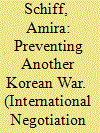

|
|
|
|
|
| Summary/Abstract |
This study explores the relevance of readiness theory’s analytical framework in illuminating the fundamentals that contribute to the de-escalation process in international crises. By applying this analytical framework to the U.S.-North Korea crisis management episode of 2017–2018, this study elucidates the interplay of elements that led to the winding down of the intense crisis and to the parties’ agreement to formally embark on negotiations at the end of the Singapore Summit in June 2018. The study shows how the multiple variables underlying the movements in conflict transformation, as outlined by readiness theory, can help to explain the effect of bilateral strategies applied by the U.S. and North Korea and the role of third-party involvement by South Korea and China in managing the crisis.
|
|
|
|
|
|
|
|
|
|
|
|
|
|
|
|
| 6 |
ID:
178456
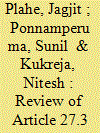

|
|
|
|
|
| Summary/Abstract |
Under Article 27.3(b) of the Trade-Related Aspects of Intellectual Property Rights (TRIPS) Agreement of the World Trade Organization (WTO), all members are required to extend private property rights to life forms. Using official WTO documents, this article analyzes the negotiating positions of WTO members on life patents during a review of Article 27.3(b) which commenced in 1999 and is currently ongoing. Initially, developing countries raised serious ethical concerns regarding life patents, creating a clear North-South divide. However, over time the position of Brazil and India moved away from the ethics of life patents to the prevention of bio-piracy, a position supported by China. Russia too is supportive of life patents. A group of small developing countries have, however, continued to question the morality of life patents despite this “BRIC wall,” changing the dynamics of the negotiations from a North-South divide to one which now includes a South-South divide.
|
|
|
|
|
|
|
|
|
|
|
|
|
|
|
|
| 7 |
ID:
178454


|
|
|
|
|
| Summary/Abstract |
What impact have different mediation outcomes had on subsequent mediation onset and success in the conflict between the government of Uganda and the Lord’s Resistance Army (LRA)? Intrastate conflicts commonly see more than one mediation effort. These efforts can result in different outcomes. Assessing the impact of different mediation outcomes on subsequent mediation efforts in the conflict between the governments of Uganda and the LRA, it becomes apparent that reneged agreements have aggravated subsequent mediation efforts, while mediation ending without an agreement and previous mediation success do not reduce the chances of subsequent mediation onset (and success). This suggests that short-lived agreements are not only likely to lead to renewed conflict, but also make further mediation efforts more difficult.
|
|
|
|
|
|
|
|
|
|
|
|
|
|
|
|
|
|
|
|
|